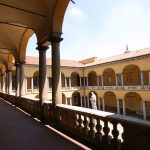The lack of basic safeguards has opened up the charter school sector to “educational entrepreneurs,” says Preston C. Green, professor of Educational Leadership at the University of Connecticut. “These actors may also run businesses whose interests conflict with the charter schools that they are operating.”
Through the state, a survey developed in partnership with UConn’s National Center for Research on Gifted Education has been sent to all district superintendents seeking information on what is being done for gifted and talented students.
“As students’ achievement increases, their chance of being identified as gifted increases, but much slower if you are an English-language learner, poor or from a underrepresented minority than if you are non-ELL and white or Asian,” said D. Betsy McCoach, a co-author of the gifted education study and a professor of education measurement and evaluation.
Dr. Grenier shares more insight about her article, “Autoethnography as a Legitimate Approach to HRD Research: A Methodological Conversation at 30,000 Feet,” with our HRD community.
As University of Connecticut professor Preston Green explains to me in an email, much of the malfeasance of charter schools comes from the entities that manage them. Called education management organizations (EMOs) or charter management organizations (CMOs), these outfits “create an agency issue with charter school governing boards that generally does not occur in traditional public schools,” Green explains.
Preston C. Green III, Bruce Baker and Joseph Oluwole’s article, entitled “Having It Both Ways: How Charter Schools Try to Obtain Funding of Public Schools and the Autonomy of Private Schools,” explains how charters use “their hybrid characteristics to obtain the benefits of public funding while circumventing state and federal rights and protections for employees and students that apply to traditional public schools.”
Trump’s proposed cuts to career and technical education offer an illustrative example of the economic consequences of reducing social spending.
Congratulations to our Neag School alumni, faculty, staff, and students on their continued accomplishments inside and outside the classroom.
Led by Erik Hines, assistant professor in the Department of Educational Psychology, students and faculty advisors from University of Connecticut’s ScHOLA2RS House traveled to the Bahia region of Brazil this spring to learn about the low access rate to higher education among Afro-Brazilian adolescents. Hines is the faculty advisor for the ScHOLA2RS House Learning Community.
A new collaboration between UConn and the University of Pavia in Italy will serve to foster not only opportunities for student exchanges among those from each university pursuing studies in the disciplines of gifted education, creativity, and talent development, but also shared research efforts in these areas.




